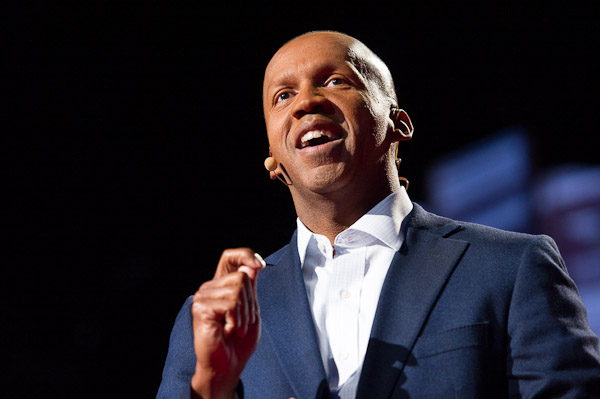Bryan Stevenson is a lawyer, social justice advocate, and law professor at New York University School of Law. Stevenson was born on November 14, 1959 in Milton, Delaware. His father, Howard Carlton Stevenson, Jr. was a laboratory technician at General Foods, and his mother, Alice Gertrude (Golden) was an equal opportunity officer at Dover Air Force Base. Stevenson attended a segregated school for kindergarten and first grade, but by second grade, classes were desegregated. In his youth, Stevenson played the piano and sang in the choir at Prospect African American Episcopal Church, now called Mother Bethel, in Philadelphia, Pennsylvania. Stevenson was introduced to the legal system early in his life. At the age of sixteen, his grandfather, Clarence L. Golden, was stabbed to death in his Philadelphia home during a robbery.
Stevenson attended Cape Henlopen High School in Lewes, Delaware, where he played on the baseball and soccer teams, served as president of the student body, and won American Legion public speaking contests. He graduated from high school in 1978 with a scholarship to attend Eastern University in St. David’s, Pennsylvania. In 1981 he graduated from that institution with a BA in philosophy. Stevenson then attended Harvard University Law School, earning both his MA in public policy and his JD in 1985 from the John F. Kennedy School of Government at Harvard. He interned at the Southern Center for Human Rights (SCHR) in Atlanta, Georgia, an organization that represents death row inmates throughout the South. Following graduation, Stevenson relocated to Atlanta, and began working for the center. Stevenson’s first major case eventually ended up before the U.S. Supreme Court as McClesky v. Kemp (1987). The high court upheld Warren McClesky’s death penalty.
Despite the loss, in 1989, Stevenson was appointed Director of the Alabama SCHR in 1989, which he called the Alabama Capital Representation Resource Center. Government funding for the center was reduced in 1994, and Stevenson converted the center into the Equal Justice Initiative (EJI), using monies from his 1995 MacArthur Grant. He became a part-time professor at New York University School of Law in 1998, achieving full status by 2002. In 2013, Stevenson placed markers at slave trading sites throughout Montgomery, Alabama, and in 2014, his memoir Just Mercy: A Story of Justice and Redemption was released. In 2017, Stevenson founded the From Slavery to Mass Incarceration Museum in Montgomery, which features markers dedicated to lynchings across the South.
Stevenson is a highly respected speaker and has received over forty honorary doctoral degrees from numerous institutions and more awards. His memoir was brought to life in the movie Just Mercy, featuring Michael B. Jordan as Stevenson, and Jamie Foxx as Walter McMillan. Stevenson was brought in as a producer for the film which was released on Christmas Day 2019.
The EJI has helped release over 135 wrongly accused prisoners sentenced to death. Stevenson admits being married to his work. He has resided in a one-bedroom apartment, continues to drive a 1988 Corolla, and pays himself just $27,000 a year for his work with EJI, choosing to pay his 30 employees more than himself.

